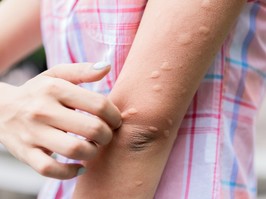salmonella cases spur warning: don't cuddle hedgehogs
an outbreak linked to the pocket pets prompts notice from the public health agency of canada

always wash your hands thoroughly after handling a hedgehog.
getty
an outbreak of salmonella cases across canada has health experts pointing to a prickly source: hedgehogs. on tuesday afternoon, the public health agency of canada issued a notice indicating that 32 cases of salmonella across six provinces have been linked to exposure to pet hedgehogs. the agency is still investigating, but believes the pets are the likely source of the bacterial infections, which can cause vomiting, fever, chills and diarrhea.
health officials say the individuals were infected between june 2017 and october 2020 and the ill ranged in age from just four months old to 79, though about 30 per cent of the infections occurred in kids under 10. four people were hospitalized, but there were no deaths reported. children under the age of five, pregnant people, the elderly and the immunocompromised are at particular risk.
“many of the individuals who became sick reported having direct or indirect contact with hedgehogs before their illnesses occurred,” the public health agency of canada release states. “stress for a hedgehog can increase shedding of salmonella.”
the agency is working with the u.s. centers for disease control, which is looking into a similar outbreak linked to hedgehogs south of the border. as of nov. 12, the cdc reported cases in 41 people across 20 states. there were eight hospitalizations, but no deaths reported.
advertisement
“hedgehogs can carry salmonella bacteria even though they appear healthy and clean and show no signs of illness. even having indirect contact by touching their environments can put you at risk for developing a salmonella infection,” the canadian agency warns.
it also cautions pet owners about proper hand hygiene, asking them to remember to thoroughly wash their hands after handling the hedgehogs and to avoid kissing or cuddling hedgehogs. other recommendations include:
- do not eat, drink or put things in your mouth while handling a hedgehog
- always wash your hands with soap and warm water immediately after touching a hedgehog, their food, supplies, or after being in the area where they live or roam, and especially before holding or caring for children under five years of age
- do not keep hedgehogs in homes, daycare centres, schools or other facilities with children aged five years and under
- always supervise children when they touch or play with hedgehogs
- regularly clean any surfaces or objects your hedgehog touches with soapy water followed by a disinfectant. personal clothing or linens that have come into contact with hedgehogs should be laundered and dried thoroughly using the warmest appropriate temperature setting
- do not bathe hedgehogs in the kitchen sink or in bathtubs or bathroom sinks
- keep hedgehogs and all their food, containers and toys away from the kitchen and other places where food is made or eaten
advertisement
salmonella infections are a common form of food poisoning and can happen in multiple ways, inlcuding eating foods such as turkey, chicken, or eggs that have not been properly cooked or stored, or even being around family members with a recent infection.
other recent outbreaks have been linked to foods such as onions. as of oct. 1, canada reported more than 500 salmonella cases linked to onions grown in california.
monika warzecha is the homepage editor at healthing.ca.
don’t miss the latest on covid-19, reopening and life. subscribe to healthing’s daily newsletter covid life.
 3 minute read
3 minute read





